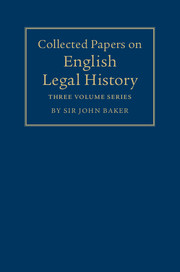Book contents
- Collected Papers on English Legal History: Volume I
- Contents
- List of Illustrations
- Acknowledments
- List of Abbreviations
- Introduction
- PART I The Legal Profession
- PART II The Inns of Court and Chancery
- PART III Legal Education
- PART IV Courts and Jurisdictions
- Collected Papers on English Legal History: Volume II
- Contents
- PART V Legal Literature
- PART VI Legal Antiquities
- PART VII Public Law and Individual Status
- 49 Personal Liberty under the Common Law 1200–1600
- 50 An English View of the Anglo-Hibernian Constitution in 1670
- 51 Human Rights and the Rule of Law in Renaissance England
- 52 Equity and Public Law in England
- PART VIII Criminal Justice
- Collected Papers on English Legal History: Volume III
- Contents
- PART IX Private Law
- PART X General
- Bibliography of the Published Works of Sir John Baker
- Index
51 - Human Rights and the Rule of Law in Renaissance England
from PART VII - Public Law and Individual Status
Published online by Cambridge University Press: 05 December 2014
- Collected Papers on English Legal History: Volume I
- Contents
- List of Illustrations
- Acknowledments
- List of Abbreviations
- Introduction
- PART I The Legal Profession
- PART II The Inns of Court and Chancery
- PART III Legal Education
- PART IV Courts and Jurisdictions
- Collected Papers on English Legal History: Volume II
- Contents
- PART V Legal Literature
- PART VI Legal Antiquities
- PART VII Public Law and Individual Status
- 49 Personal Liberty under the Common Law 1200–1600
- 50 An English View of the Anglo-Hibernian Constitution in 1670
- 51 Human Rights and the Rule of Law in Renaissance England
- 52 Equity and Public Law in England
- PART VIII Criminal Justice
- Collected Papers on English Legal History: Volume III
- Contents
- PART IX Private Law
- PART X General
- Bibliography of the Published Works of Sir John Baker
- Index
Summary
The general reaction to the title of this paper has been one of incredulity. Surely there were no human rights in the time of Henry VIII or Bloody Mary? Could anyone in their right mind reconcile the ‘Henrician despotism’ with the rule of law? Your topic, Professor Baker, should not occupy us for many minutes. Well, it depends on whether we regard such concepts as descriptive or normative. It is perfectly possible to find early-modern assertions of many, perhaps most, of the standards or aspirations which have been relabelled in our own time using the terminology of universal human rights. And it is equally possible to find instances in our own time of government activity falling short of those standards, especially when a country is felt to be in danger from hidden enemies. Legal and moral norms are not disproved by showing that in practice they are sometimes ignored or laid aside. It is therefore worth exploring the hypothesis that these ‘human’ rights are not such a new departure as is fashionably supposed, but an attempt to restate and refine assumptions which have long been present in the common law.
Needless to say, human rights were not known by that name in Renaissance England, or even in Victorian England. English law was not primarily a law of rights, except in the property sense, though we do begin to hear in Tudor times of the general ‘rights’ of subjects – and it may be noted that some of the earliest references are found not in subversive literature, but in the legislation of our despotic Henry VIII. In the seventeenth century the language of rights became more familiar to lawyers, and was especially favoured by lawyer-parliamentarians resisting the encroachments of prerogative rule under the early Stuarts.
- Type
- Chapter
- Information
- Collected Papers on English Legal History , pp. 933 - 954Publisher: Cambridge University PressPrint publication year: 2013



